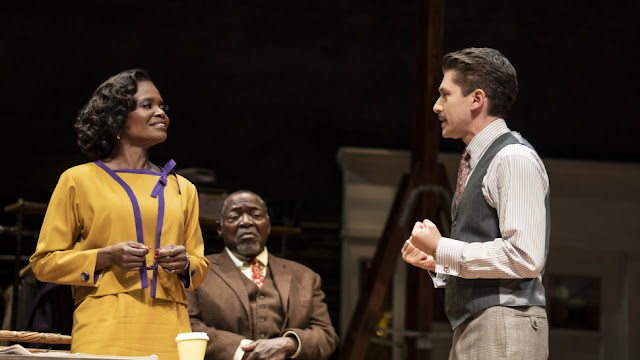Some stories do not translate easily into musicals but work nonetheless. Other stories do not. World premiere musical, Kimberly Akimbo definitely falls into the second category. Although technically a musical about Kimberly, who ages 4 to 5 times more quickly than normal, the show throws everything against the wall to see what sticks.
Kimberly Akimbo gives us judgement free theft and grand larceny by minors. Aiding and abetting grand theft, with the only parental figure Kimberly has, is treated as a big joke. It gives us extortion, murder, and assault, all without judgement or consequences. In fact, the only thing that does bring results is when someone is mean to Kimberly, then cosmic karma is visited upon the perpetrator.
Let’s start with the basics, Kimberly is a 16 year old child, but wrapped in an old lady's body because she has a disease that only affects 1 in 50 million people. Somehow, even with this extremely rare and complex disease, she lives with her alcoholic father and abusive mother, with nary a health care worker, or responsible adult, in sight. Sarcasm aside, Victoria Clark is fantastic in the role of Kimberly. She brings a freshness and teenage angst to Kimberly, as well as the role of young caretaker for the family that cannot function without her.
Her tentative crush / love interest is Seth, played perfectly by Justin Cooley. A young actor in his Off-Broadway debut, he navigates the tricky role in a touching and believable way, out of step with the rest of the cast, bar Kimberly herself. However, the character is given an extremely annoying habit of making anagrams – and singing about them.
Bonnie Mulligan is hilarious in the role of Debra. Debra is young Kimberly’s aunt. Dedicated to a life of low-level crime, Debra is the closest Kimberly has to an adult role model. And that is saying something as Debra enlists all 6 high school students into a scheme that involves forgery, theft, and mail fraud. Which, of course, works and no one gets caught.
Kimberly’s parents, played by Steven Boyer and Alli Mauzey, are an alcoholic mess and inattentive and mentally abusive mother. The story occurs around Kimberly’s 16th birthday, which is the average age of death for someone with her condition. No disrespect, but it is a Hallmark movie you always wanted, if you wanted the killer babysitter to get away with it and marry the unsuspecting husband – all the while singing about it.
Most of the singing is excellent, although the songs were not terribly memorable. The ice skating on stage was a little disconcerting, but not out of character for the show.
Kimberly Akimbo starts a bit odd, and then gets odder as time goes on. The audience I saw it with started with loving the songs and showed it with extended applause. But they grew less and less enamored as the story became unmoored from reality. There are the bones and music of a great story in there somewhere. It is too bad it is all mixed up.
 |
| Victoria Clark and Justin Cooly on the lam (Ahron R. Foster) |
I neither loved nor hated Kimberly Akimbo, but I admired its convictions to stay true to this odd fantasy. I didn’t admire it enough to recommend it to everyone. I think to really enjoy it, you would have to treat it as a very black comedy, which I do not think it is what the producers intended.
Kimberly Akimbo




























